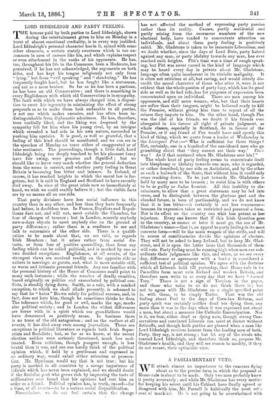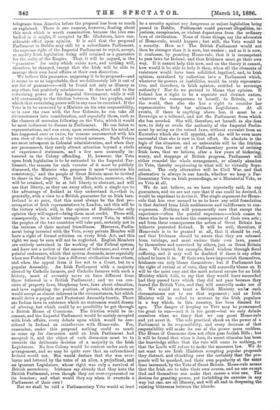A PARLIAMENTARY VETO.
WE attach almost no importance to the rumours flying about as to the precise form in which the proposal of Home-rule is about to be made. Only two men probably know it pretty accurately ; and while Mr. Gladstone has every motive for keeping his secret until his Cabinet have finally agreed or disagreed with him, Mr. Parnell is habitually the most ret'. cent of mankind. He is not going to be overwhelmed with
telegrams from America before the proposal has been so much as explained. There is one rumour, however, floating about this week which is worth examination, because the idea em- bodied in it might, if accepted by Mr. Gladstone, have con- siderable effect upon opinion. It is said that the proposed Parliament in Dublin may still be a subordinate Parliament, the supreme right of the Imperial Parliament to reject, accept, -or modify Irish legislation being still retained as a guarantee for the unity of the Empire. That, it will be argued, is the " guarantee " for unity which exists now, and nothing will, therefore, be changed, except that the Irish will be able to manage their own local affairs at their own discretion.
We believe this guarantee, supposing it to be-proposed—and it seems to us so improbable, that-we deliberately left it out of our list of guarantees—will be found not only as illusory as any other, but positively mischievous. It does not add to the restraining power of the Imperial Government, while it will add enormously to the friction between the two peoples, amid which that restraining power will in any case be exercised. If the Veto is to be exercised by a Minister on his own responsibility, a3 is now the case with the free Colonies, he can take all circumstances into consideration, and especially those, such as the chances of secession following on the Veto, which it would be most indiscreet to discuss in Parliament. He can listen to representations, and can even, upon occasion, alter his mind, as has happened once or twice, for reasons unconnected with his own view of the wisdom of the vetoed measure. Such Vetoes are most infrequent in Colonial administration, and when they are pronounced, they rarely attract attention beyond a circle of experienced statesmen, and a few men unusually in- terested in the Colony offending. If, however, the Veto upon Irish legislation is to be entrusted to the Imperial Par- liament, the reasons for each exercise of it must be publicly discussed, the Minister who proposes it must "maintain his consistency," and the people of Great Britain must be invited to share in the dispute. The Irish Members, moreover, who will be retained, will be at full liberty to obstruct, and will use that liberty, as they use every other, with a single eye to the advantage of Ireland as they understand it,—that is, generally, with a view to a British guarantee for an Irish loan. Ireland is so poor, that this must always be the first pre- -occupation of Irish representatives in London, and this will be the eictory which will, in the opinion of Dublin—the only opinion they will regard—bring them most credit. There will, consequently, be a bitter wrangle over every Veto, in which the peoples of the two countries will take part, certainly not to the increase of their mutual friendliness. Moreover, Parlia- ment being invested with -the Veto, every private Member will have a right of formal criticism on every Irish Act, and this right we may be sure will not be neglected. English Members are entirely untrained in the working of the Federal system, and have not a notion of the amount of tolerance, and even of painful endurance, which that system demands, more especially when one Federal State has a different civilisation from others, and when the appeal from it lies not to a Court, but to a popular Assembly. An Irish Parliament with a majority elected by Catholic farmers, and Catholic farmers with such a history, must of necessity move on lines different from those followed in a British Parliament ; and we can con- ceive of property laws, blasphemy laws, laws about education, and laws regulating the position of priests, which statesmen would accept as almost inherent in the circumstances, but which would drive a popular and Protestant Assembly frantic. There are Indian laws in existence which no statesman would dream . of altering, but which could by no possibility be got through a British House of Commons. The friction would be in- cessant, and the Imperial Parliament would be mainly occupied with Irish affairs, every debate upon which would be con- sidered in Ireland an interference with Home-rule. For, remember, under this proposal nothing could so much as come up for discussion until an Irish Parliament had accepted it, and the object of each discussion must be to override the deliberate decision of a majority in the Irish Legislature. No free Colony would be content under such an arrangement, and we may be quite sure that an enfranchised Ireland would not She would declare that she was over- borne and fettered, by the votes of an alien, a prejudiced, and an ignorant Legislature, whose' right was only a survival of British ascendency. Irishmen say already that they hate the British Parliament, even though they are over-represented on its benches ; and what would they say when it overrode a Parliament of their own ?
But we shall be told a Parliamentary Veto would at least be a security against any dangerous or unjust legislation being passed in Dublin. Parliament, could prevent illegalities in- justices, conspiracies, or violent departures from the ordinary laws of civilisation. None of those things, say the advocates of Home--rule, would happen' but still, the Veto would be a security. How so The British Parliament would not then be stronger than it is now; but weaker ; and as it is now, it confesses, by granting Home-rule, that it is incompetent to pass laws for Ireland, and that Irishmen must go their own way. If it cannot help this now, and on the theory it cannot, how would it be able to help it then, when all the elements of resistance would have been solidified, legalised, and, in Irish opinion, moralised by collection into a Parliament which, whatever its powers or inabilities, would be truly representa- tive, and therefore, in Irish opinion, entitled to sovereign authority ? Nor do we pretend to blame that opinion. If Ireland has a right to be a separate and distinct nation, whatever the consequences to herself, to Britain, or to the world, then also she has a right to consider her
representative body her ultimate Legislature. At all events, if there is anything above her, it must be a Sovereign or a tribunal, and not the Parliament from which she has seceded. She will, therefore, set herself, as she does now, to defy or evade the authority of the Imperial Parlia- ment by acting on the vetoed laws, without restraint from an Executive which she will appoint, and she will be even more successful than she is now in that effort. So absolute is the logic of the situation, and so unbearable will be the friction arising from the use of a Parliamentary power of revising Irish laws, that we believe, after a few years of bickering,. worry, and stoppage of British progress, Parliament will either remodel the whole arrangement, or silently abandon its Veto, thereby acquiescing in what will be virtually Sepa- ration. The only alternative will be Civil War, and that altennative is always in our hands, whether we keep a Par- liamentary Veto on Irish proceedings, or a Ministerial Veto, or. no Veto at all.
We do not believe, as we have repeatedly said, in any guarantees, and we are not sure that if one could be devised, it would be expedient to devise it. The single argument for Home- rule that has ever seemed to us to have any solid foundation is that derived from Irish recklessness and indifference to con- sequences. Nothing will permanently cure that except the experience—often the painful experience—which comes to those who have to endure the consequences of their own acts ; and from these consequences the action of Great Britain has hitherto protected Ireland. It will be well, therefore, if Home-rule is to be granted at all, that it should be real, and that Irishmen should be aware that they are released from tutelage, and must endure their own laws, passed by themselves and unrevised by others, just as Great Britain does. We learned, for example, fiscal wisdom through fiscal suffering, and it may well be doubted if there is any other school to learn it in. If their own laws impoverish themselves, Irishmen can only blame themselves ; but if Parliament has the right of revisal or of veto, they will assuredly blame us. It will be the most easy and the most natural excuse for an Irish Ministry which fails, to say that they would have succeeded had. they passed laws which they did not pass because they feared the British Veto, and they will assuredly make use of it. We would not trust a British Ministry under such circumstances not to use that argument ; and an Irish Ministry will be called to account by the Irish populace in a way which, in this country, has been disused for ages. The danger of keeping no Veto may be pronounced too great to run—and it is too great—but we only delude ourselves when we fancy that we can grant Home-rule and yet avert it. The sole practical check on the power of a Parliament is its responsibility, and every decrease of that responsibility will make its use of the power more reckless. The House of Commons does not often pass foolish Bills; but it will be found that when it does, its secret stimulus has been the knowledge either that the vote will come to nothing, or that the Lords will refuse to make the measures law. We do not want to see Irish Ministers accepting popular proposals they distrust, and chuckling over the certainty that the pro- posals will be quashed, and their own popularity at the same time increased, by the Veto of Great Britain. Home-rule means that the Irish are to take their own course, and no one except pod and themselves can make that course a wise one. The devices for granting power, yet forbidding its exercise in any may but one, are all illusory, and will all end in deepening the existing bitterness between the islands.







































 Previous page
Previous page